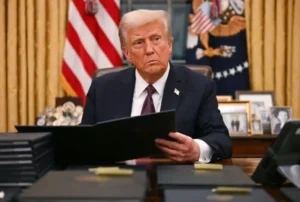
President Donald Trump has signed an executive order declaring English as the official language of the United States, a move that is expected to have significant implications for government operations, education, and public services.
The executive order, signed at the White House, mandates that all federal agencies conduct official business in English. It also directs government offices to phase out multilingual documents and services, except in cases required by federal law or for emergency situations.
“This is about unifying our nation under one common language,” President Trump stated during the signing ceremony. “English is the language of opportunity, and this order ensures that every American has the chance to succeed.”
The decision has sparked both support and criticism. Proponents argue that the measure will strengthen national identity and reduce government spending on translation services. However, civil rights organizations and immigrant advocacy groups have raised concerns that the order could marginalize non-English-speaking communities and create barriers to accessing essential services.
Legal experts anticipate challenges to the order, particularly regarding its impact on protections under the Civil Rights Act and other federal statutes that mandate language accommodations.
As the policy takes effect, agencies across the country are expected to adjust their language accessibility guidelines, while lawmakers and advocacy groups prepare for potential legal battles.




